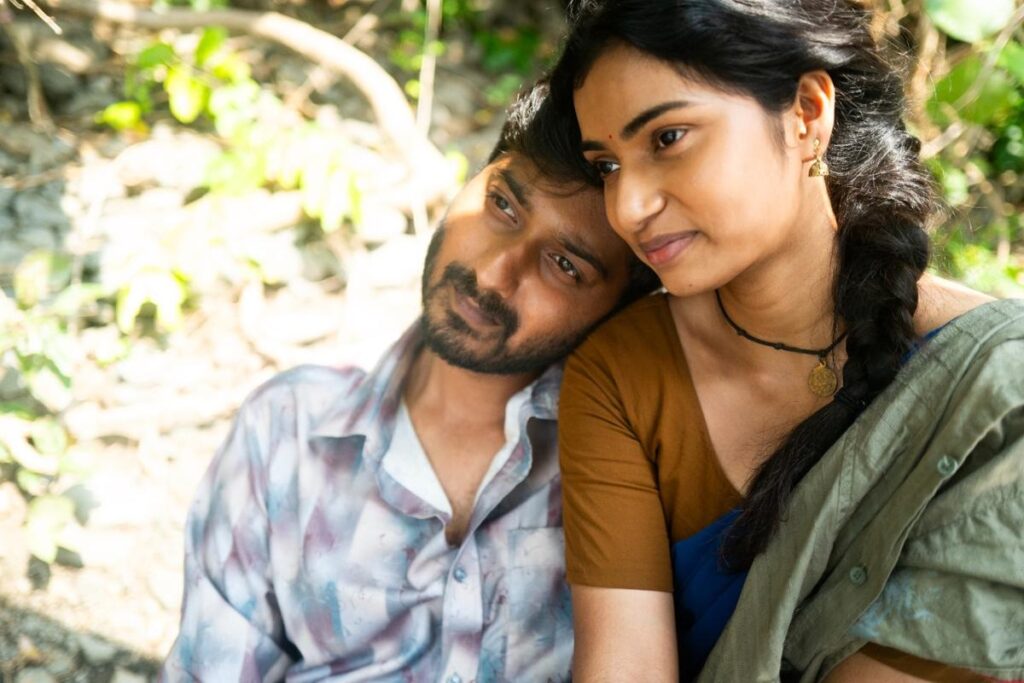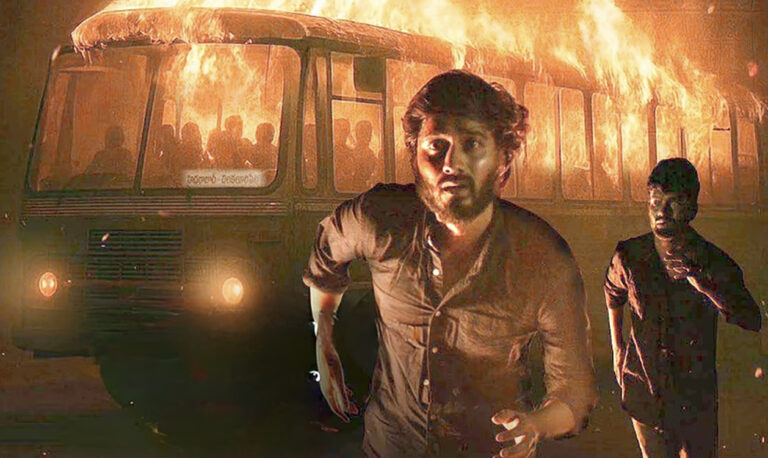“23 (Iravai Moodu)” by Raj R is a bold, realistic film highlighting deep-rooted social injustices in Andhra Pradesh through tragic real-life incidents. While its urgent message and moral clarity stand out, its execution and craftsmanship reveal some shortcomings. Overall, it aims to provoke reflection on systemic inequality and caste bias.
This story is uplifting and based on social injustice, with Teja R as the determined protagonist and Jhansi as a brave woman fighting for truth. Their lives become intertwined through a series of tragic events that expose the flaws in the justice system. As they confront these challenges, the film highlights the importance of hope, resilience, and societal reform. With compelling performances and a powerful message, it inspires viewers to believe in the possibility of positive change.
Raw, Unvarnished Storytelling
Through the bold and thought-provoking film, “23 (Iravai Moodu),” systematic injustices throughout social hierarchies are made visible. It connects multiple tragic incidents over the years, raising important questions about justice and reform. The impactful dialogues and strong protagonist development add depth, despite some pacing issues. Overall, it’s a commendable effort in meaningful regional cinema that invites viewers to reflect on critical social issues.
Raj R’s directorial approach is rooted in raw, unvarnished storytelling, emphasizing authenticity and social commentary over commercial gloss. His commitment to portraying societal injustices with unfiltered honesty is evident in the choice of naturalistic performances, candid dialogues, and unembellished settings. The director’s intent to create a visceral experience is laudable, and his efforts to blend fictional narrative with documentary-style elements lend the film a distinctive tone that sets it apart from conventional crime dramas.
One of Raj R’s notable strengths lies in his ability to evoke a sense of immediacy and realism. His decision to eschew over-the-top dramatization in favor of naturalistic scenes helps to underline the gravity of the issues being portrayed. This grounded approach fosters a sense of trust and engagement, encouraging viewers to confront uncomfortable truths. Additionally, the director’s willingness to tackle complex social issues head-on reflects commendable moral courage and a deep sense of social responsibility.
Highlighting Overlooked Injustices
Furthermore, Raj R’s careful framing and attention to detail in certain sequences effectively highlight the stark contrasts between different social strata, subtly reinforcing the film’s central themes. His effort to craft a narrative that is both informative and emotionally compelling is evident, and his passion for shedding light on overlooked injustices is palpable throughout the film.
Raj R’s directorial approach is rooted in raw, unvarnished storytelling.”
The narrative shifts between the emotional depths of individual characters and the broader socio-political critique, sometimes without seamless transitions, leading to a disjointed viewing experience. It has scenes that have too much length or skip important emotional moments. Moreover, while Raj R’s focus on content-driven storytelling is commendable, a more refined editing could have enhanced emotional engagement and thematic clarity. Nonetheless, his fearless exploration of sensitive issues underscores a dedication to social responsibility that is rare in contemporary regional cinema.
Striving for Artistic Authenticity Amid Limitations
The cinematography by Sunny Kurapati complements Raj R’s vision by capturing the rustic beauty and raw realities of village life and urban decay. The use of natural lighting and realistic color tones grounds the film in its socio-cultural setting, creating a believable visual universe. This straightforward visual style ensures that the focus remains on the narrative and performances, enhancing the film’s sincerity.
In terms of production design, the authenticity of locations and costumes anchors the story firmly in its socio-cultural context. Yet, the absence of visual innovation leaves the cinematic experience feeling somewhat static, reducing the potential for memorable, visually compelling sequences that could have heightened the film’s impact.
The film stands out due to its unfiltered, documentary-style portrayal of social issues, which is deliberate and averse to glossy, commercial cinema aesthetics. Its ambitious narrative weaves multiple incidents across years, reflecting a desire to depict reality’s complexity. The film’s focus on lesser-known events and its refusal to sensationalize tragedy lend it journalistic depth, encouraging viewers to reflect on ongoing injustices faced by marginalized communities. Although the multi-layered storytelling presents execution challenges, its thematic daring pushes regional cinema towards greater social consciousness.
An Unconventional Approach to Social Commentary

Teja’s portrayal of Sagar captures his initial innocence well, though his emotional range could be more nuanced during pivotal moments, enhancing audience connection. Tanmai Kushi brings sincerity and freshness to Susheela’s village scenes, effectively conveying her character’s naivety. The supporting cast, including Pawon Ramesh, Praneeth, and Jhansi deliver convincing performances that add depth and emotional resonance.
Overall, the film’s commitment to realism and social critique makes it a significant and thought-provoking work in contemporary Telugu cinema. The music complements the narrative well, with soulful melodies that enhance key scenes, though a few tracks could have been more memorable. Overall, the performances and soundtrack contribute positively to the film’s impactful storytelling
“23 (Iravai Moodu)” is a film that reveals social injustices with sincerity and authenticity, making it both eye-opening and incisive. Raj R’s earnest direction provides a strong foundation for its impactful storytelling, reflecting a genuine commitment to meaningful themes. While some aspects could benefit from better cohesion and innovation, the film’s moral focus sets it apart. Overall, it stands as a noteworthy contribution to regional cinema’s dialogue on justice and inequality.
“23 (Iravai Moodu)” released in India, but is showing in some part of the United States. Click here for full list.



